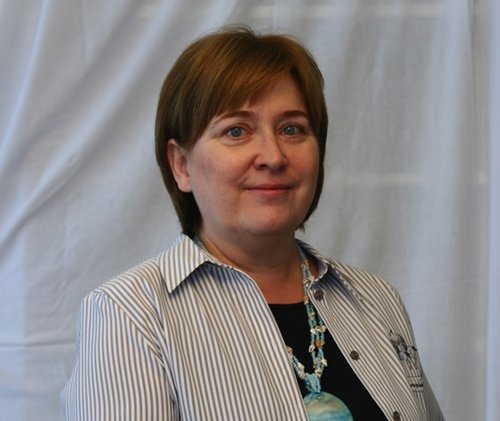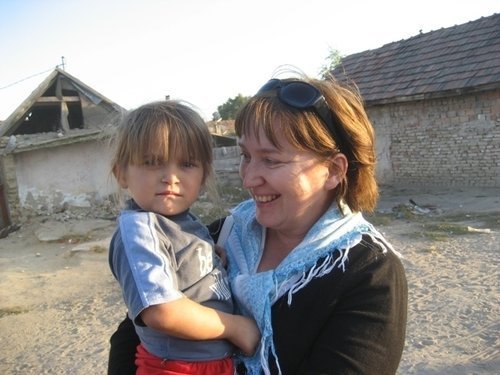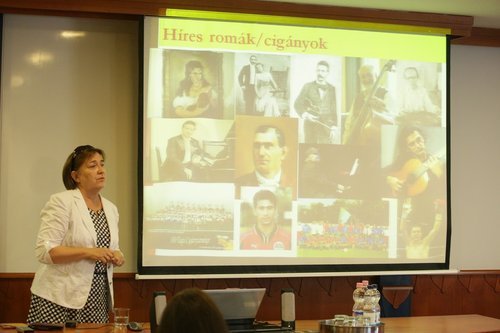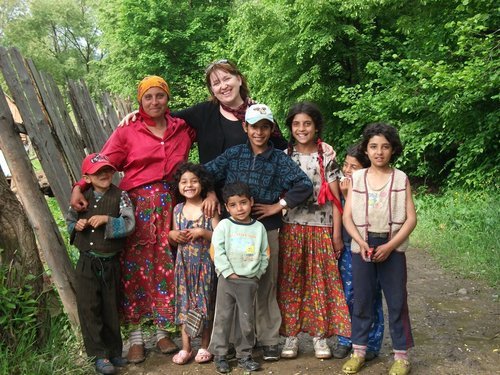Starting this September, it will be mandatory for all students to learn about Roma studies at the Debrecen Reformed Theological University. The university has set up a separate department for bringing students closer to Roma history, culture, and traditions. The department will be led by Romologist Mrs. Judit Kármán Szabó Phd., who is convinced that the department could turn the negative view of Roma in society into a better one.

Mrs. Judit Kármán Szabó Phd. has been teaching Roma studies for nearly twenty years. She is of the opinion that Hungarian society isn’t racist, people just don’t know the Roma enough, and it’s more comfortable for society at large to think of them in terms of stereotypes. She thinks that the Romology Department of the Debrecen Reformed Theological University (DRHE) will be a positive example to other universities, and she would like to familiarize the Roma with more and more people to overcome the fears and prejudices that society has against them.
From this September, you will be the senior lecturer in the Debrecen Reformed Theological University’s (DRHE) Romology Department. Who gave you the opportunity for this position?
Debrecen Reformed Theological University’s Vice-rector, the Rev. Zoltán Kustár, visited me by the charge of Rector Gusztáv Bölcskei. At our meeting he told me that the leadership of the University had decided to establish a Romology Department and they wanted to ask me to develop the courses as well as to organize and lead the department. That’s how I got the opportunity, which I’m really glad about.
This is based on the decision of the Rector, and of other leadership, that no one should leave the University – regardless of their department – without having basic Romology knowledge and skills, which are necessary for the successful cooperation and coexistence in Hungarian society.
The DRHE decided to make the Roma studies classes compulsory for their students. Why do you consider this important?
The majority of Hungarian society still does not know enough about the Roma. I have been teaching Romology for nearly twenty years, as an optional course in higher education, so I could say that the picture that society has about the Roma society is fake, and most of the time, it is negative. Most people don’t know anything about the Roma – they don’t know how they enriched our history and they don’t know how many famous artists, musicians, and cinematic artists came from this group.
My students are always amazed and they tell me that they learn new things in my courses that they don’t get from any other sources. The transmission of this knowledge is essential for several reasons: firstly, non-Roma students get to know the Roma which transforms their stereotypical ideas, and secondly, a more realistic and positive picture about the Roma could generate changes within the Romas own environment. If an ethnic group with nearly one million members receives only negative messages or rejection from society at large, then its self-image can become severely damaged. Roma kids, whose community is a despised minority, experience rejection from the majority population at a very early age. Children might be denied from schools, the non-Roma students may not want to sit next to them, they hear and experience the negative popular opinion about them, and even the media around them shows them as a problematic group. The child will eventually start to believe what majority of the society communicates about him: that he or she is not capable of anything. This child will then reflect these negative ideas on to themself and will take it as their life aim, saying over and over that, “I’ll be never good enough” or “I’ll never reach my potential.” Due to all of this, some Roma deny their roots or change their names, but the opposite may also happen where they become a defiant nationalist, almost-anti-Hungarian, because of the rejection and unfairness that they have experienced in life. I know a family where the father has a typical Roma appearance and didn’t want others to know, so he avoided his children’s school; he didn’t take part in his son’s graduation because he wanted to hide his son’s Roma roots.
It is not permissible for an ethnic group with low self-esteem to live among us as a victim of these negative stereotypes. The whole society will become ill, mentally, if we have a wounded minority with identity issues; so when we reject our fellow humans – a person or an ethnic group –we are actually doing wrong by ourselves and by society too.

Young pastor students are more socially sensitive, but this doesn’t necessarily mean that they are free from prejudice. Do you think that the training will help these young people to overcome their prejudices?
I have experienced that those who are confronted with a positive Roma image transform their opinion for the better. It is important to have facts to overcome prejudices, but personal encounters are also essential; visits to gypsy ranches or in ghettos, conversations with those who are living there, and learning about their circumstances are all important. What is more vital than this, however, is that students must become acquainted with educated, successful, and cultured Romas of all ages. I have a lot of well-mannered and educated Roma friends and I always invite them to my university courses, which will soon be part of this department too, to speak about their lives. These encounters, these conversations, have a big impact because a significant portion of today’s non-Roma youth grows up without any contact with Roma. These young people get information mostly from media outlets around them, which clearly have a negative slant towards the Roma. Those young people who don’t know the history of the Roma are always surprised when they hear that the Roma, during the era of state socialism, were transported by ‘Black train’ [During socialism, this was a train that shuttled people, mostly Roma between the Eastern Hungary and Budapest] to industrial and mining towns to work; they were forced to fend for their families rather than staying put and receiving social aid. Once the students learn this, it is then comprehensible to them why it is hurtful to call an elder Roma man a “gypsy”; even during the re-building of the country, the Roma worked almost the same proportion as the non-Roma. This transfer of knowledge helps a lot in overcoming prejudices.
How it is possible to make changes?
Sensitization is very important; recognizing and trying to understand the circumstances of the needy – their daily livelihood problems, their joys and plans, the opportunities and motivations, as well as the setbacks that they face. These aren’t things that you learn from a book, and that’s why I take my students to gypsy ranches, ghettos or different gypsy programs –including music, dance, exhibitions, and book and film premiers – to feel and see how they live. The students see the origins of those who will be educated by them and who will hear God’s words, which will be preached by these young pastors. We must sweep away their fears or prejudices and get great experiences with the Roma in order to develop their communication skills to achieve success in their service among them.
Can the work of the Department transform the negative Roma image?
I really hope so. All the theoretical and practical lessons serve this purpose. Otherwise, the society’s Roma image will not change until they are met with positive experiences and information. I’m convinced that Hungarian society isn’t racist, they just don’t know the Roma and, for them, thinking in stereotypes is a more comfortable way of life. All of these phenomena are enough for estrangement, prejudice, and extreme anger. We hope to change this.
Beyond the students’ general education, we work to develop new knowledge in them. It is simply unacceptable that graduates aren’t capable to name a Roma poet, writer, artist, actor, or world-known musician who has added great value to the global and Hungarian culture.

According to press reports, the process to begin this work began around the New Year. How do you envision the operation? How many people will work together?
That’s true! I have been working at the University since the beginning of the New Year. At the moment, we will launch as a small department with only two people. The mandatory trainings begin in September, but we launch a course in the spring semester for those who are on religious and non-religious specialization. The semi-annual material is actually a kaleidoscope and provides insight into many different facets of Roma life; the sub-heading for this course is, “What you ought to know about the Roma.” Students will also get an introduction to the Roma Mission of RCH.
What will the syllabus look like for September?
Courses will be separated by specialization in September. Two semesters will cover basic subjects and everyone will learn these. The first semester will deal with the history of Roma society and the second semester will examine the different groups, cultures, and traditions of the Roma. These will provide a basic foundation for the third semester’s profession-specialized courses for students.
Profession-specialized training sounds helpful because a pastor, an arts student, and a teacher each require different teaching methods. Will the curriculum provide room to share a bigger overview about the Roma?
Of course, yes. For example, the cantor students’ third semester Roma class would cover the culture of gypsy music and dance as well as the practice of worship among the Roma. The pastoral students’ third semester would be about the unique challenges of pastoral care among the Roma people. In the Reformed Church, there are a lot of great pastors who have been serving with Roma people for years; we are expecting to take advantage of their theoretical and practical knowledge as we invite them to hold lectures and as we send our students to them for internships. The pedagogy students’ specialized courses would include the acquirement of inclusive and integrative teaching methods taught by teachers who have had vast experience in the field and achieved excellent results in their work.
If I understand correctly, the training has not only theological but practical methods too.
In the first two semesters, during the foundation subjects, the students have to get practical knowledge as well as theological knowledge. The third semester is absolutely practical-orientated – we will visit Roma congregations, serve next to pastors who work with Roma, visit institutions who have a large headcount of Roma students, and even take part in summer camps with Roma.

Can you imagine this initiative having an effect on other universities?
I hope so, but we have to work for it. We first have to secure the high level of education and the researching and publication activities.
This will be the second Romology department in the country. Why do we only have two of them?
Perhaps there is not such openness and receptivity in other universities. Above all, this decision to have one shows our serious intent. The initiative of DRHE is unparalleled; there is no other higher educational institute in the country where every student must learn Roma studies for three semesters.
Who will you corporate with? Do you have a plan for this?
According to our plans, we expect active cooperation with a Roma Special Collegiums, primarily the István Wáli Reformed Roma Special Collegium in Debrecen as we have already consulted with the director of the institute, Áron Mózes. We also have a great relationship with the RCH Roma Mission and have begun to make contact with pastors and social workers there too.
Scientific cooperation is also essential; we have started to cooperate with the University of Pécs and the Coordinator for Roma-related work at the Károli Gáspár University of RCH. We would like to set up a Romology workshop and we would be thrilled if we could create a space to organize events in the city or in the region for the discourse of the Roma researchers and professionals. We are very open to common thinking.
What are the difficulties you have to face now?
We didn’t really experience difficulties, but we have a plenty of things to do and the tasks should be carried out; we get a lot of help and support from the leadership and the colleagues of the University. Above all, we trust in God’s blessing; we hope that this training will be a great blessing to everyone – for those Roma who will we served by our students and for those students who could reach great results in their service among the Roma people.
Interview by Krisztina Balogh
Translation by Lilla László